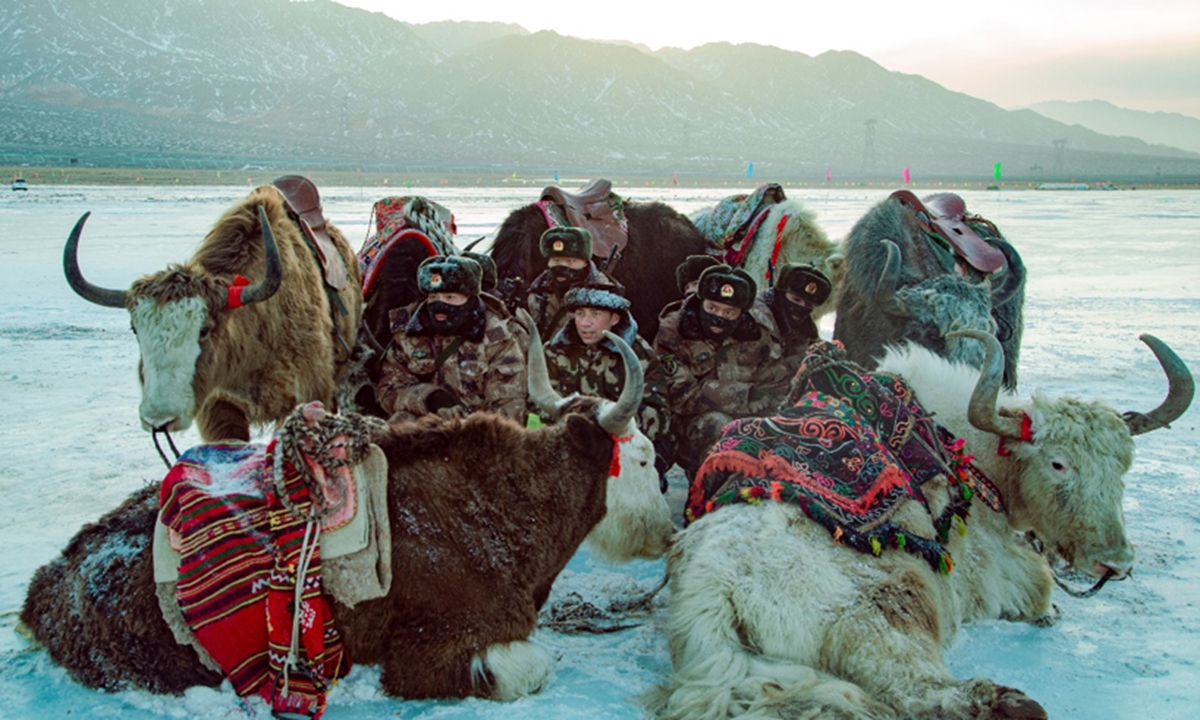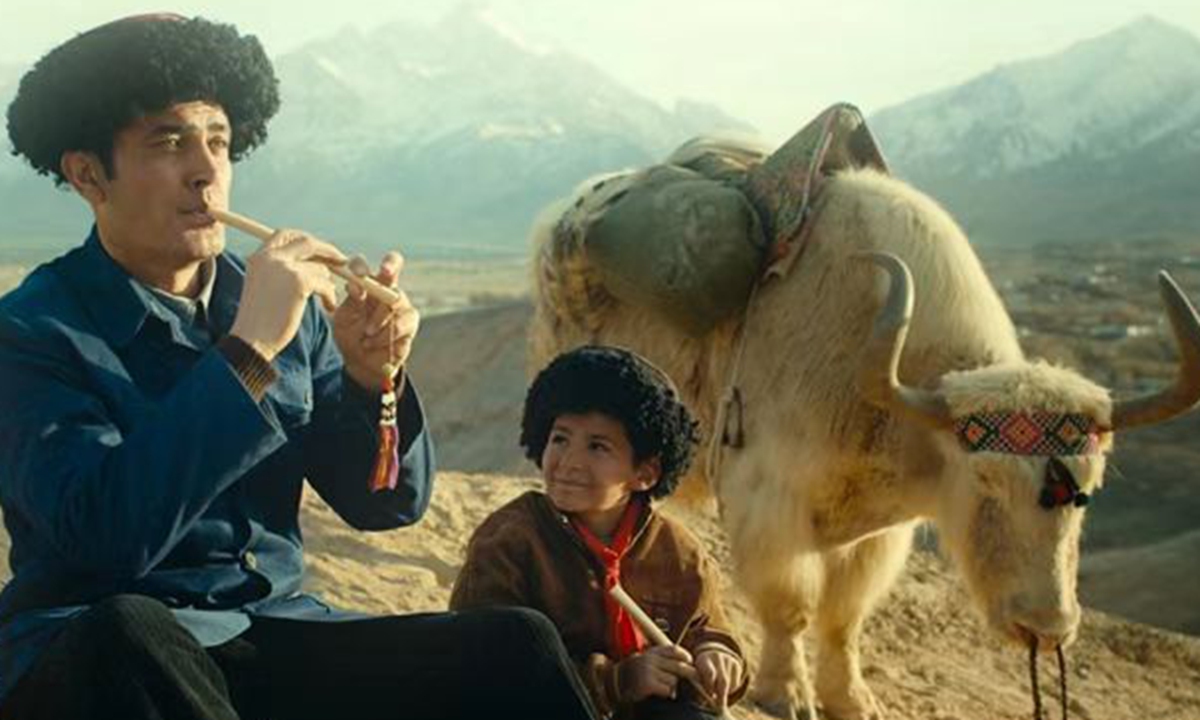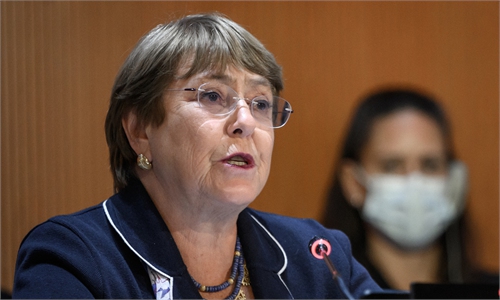ARTS / CULTURE & LEISURE
New film celebrates spirit of Xinjiang's volunteer frontier guards
Red flowers bloom

Promotional material for Why Are the Flowers So Red Photo: Courtesy of Tianshan Film Studio

Promotional material for Why Are the Flowers So Red Photo: Courtesy of Tianshan Film Studio
"I live in the Pamirs. My uncles patrolled hundreds of kilometers along the frontier with soldiers of the Chinese People's Liberation Army. They were not actually soldiers, but they were real frontier guards."
This is a line from the voiceover for the trailer of a new movie focusing on the stories of the patriotic heroes in Northwest China's Xinjiang Uygur Autonomous Region. The movie, released on Friday, is titled Why Are the Flowers So Red, which is also the name of the theme song for the classic Xinjiang film Visitors on the Icy Mountain.
The movie is based on the life of national role model Laqini Bayika, a 41-year-old folk frontier guard who sacrificed his life to save a child who had fallen into icy water in January 2021.
"This individual is a microcosm of the times. We need more ordinary people's stories when telling the entire story of Xinjiang," Yin Hong, vice chairman of the China Film Association and a professor at Tsinghua University, told the Global Times on Wednesday.
Red flowers in Xinjiang
Why Are the Flowers So Red, directed by Abdukerim Abliz, tells the story of a Xinjiang family across three generations. From grandfather to grandson, three men in the family volunteer to patrol the border on the Pamir plateau across seven decades.
They were constantly outside in the snowy mountains, eating as the wind howled around them, sleeping in the open and wearing simple clothes all year round. They saw border soldiers as their family and often acted as guides for them on the plateau.
Bayika, the guard who gave his life, was the grandson.
Abliz, who first arrived on the plateau to film another movie three years ago, told the Global Times that filming a big budget biopic on a frigid plateau was one of the biggest challenges in his 30-year career.
"On the Pamir plateau, people of the Tajik ethnic group have traditionally guarded the frontier for the motherland from one generation to another. Three generations of Bayika's family were part of these unsung border guards who protected the border regardless of how much they were paid and even at the risk of losing their lives. I wanted to film the story of this family and depict the history of this group across 100 years," Abliz said.
The movie stars Kutilukejiang Aishahujia making his film debut as Bayika.
Aishahujia told the Global Times that he was honored to play Bayika because his father and several older relatives are also frontier guards and he can understand how strong-willed and marvelous Bayika and the other guards are.
"We trudged across the Pamir plateau at an average altitude of 4,500 meters, and almost every day we suffered headaches and dizziness. In some cases, we had to lead yaks across the snowy plateau. The wind was strong and cold," the actor recalled.
Filming the scene where Bayika jumps into the water to save the child was the most memorable moment for him.
"I had to repeatedly jump into the water. It was deadly cold."
After filming the scene, Aishahujia said since he can better understand the greatness of Bayika, he was able to ignore the biting cold that the actor could barely stand.
"He was only thinking about saving the child. I think he really tried his best to protect his beloved hometown through his actions."
Although his family's daily work brought him in contact with the life of a frontier guard, Aishahujia noted playing the role has given him a better understanding of the spirit of these people who guard the border of the motherland with their lives and how that selfless spirit makes the flowers in Xinjiang brighter.
"No matter how bad the weather gets, they patrol along the border. I feel like the only time they feel safe is when they are on patrol. For me, it is admirable to see a border guard like Bayika, who didn't wear a uniform but guarded the border nevertheless."
Focus on ordinary people
The stories of ordinary Xinjiang people such as Bayika can easily be adapted to film or TV shows, Yin noted because they have the power to resonate with the mainstream audience.
Yin added that films about Xinjiang must pay attention to people, especially young people as well as their regional and ethnic features.
The movie is trying to bridge the gap between ordinary people and the country's role models and explore people's feelings and spiritual worlds in the unique geographical landscape of Xinjiang, Huangfu Yichuan, chief editor of the magazine Contemporary Cinema, said.
Abliz has also worked on other films about Xinjiang, including the musical The Wings of Songs released in March 2021, which focused on the local cultures of Xinjiang. As a crossroads for the East and the West, Xinjiang has a long history of cultural exchanges and local people have their own unique traditional dances and songs for various celebrations.




